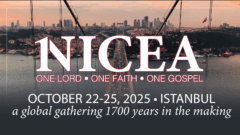More than once I have been accused of being a bibliolater, a person who idolizes the Bible, who has excessive reverence for the letter of the Bible. I’m sure many other Christians have been accused of this as well. In my experience, this charge tends to be leveled against those who affirm the infallibility or inerrancy of Scripture; it may also be leveled against those who affirm the sufficiency of Scripture. People who level such a charge are objecting to what they see as a woodenness of faith and practice that stems from an understanding of Scripture they deem too literal.
I am quite sure that I do not idolize the Bible and I am quite sure it is far more difficult to do than the accusers may think. Let me tell you how I think about this charge.
We, as sinful human beings, have lost the right and the ability to have unmediated access to God. Before they fell into sin, Adam and Eve had the privilege of walking and talking with God. They had direct, face-to-face access to the Creator. This is a privilege we eagerly anticipate reclaiming when the Lord returns, but in the meantime, polluted as we are by sin, we have severed that direct communication. We now rely on communication from God that is mediated by Scripture. John Stott once said, “God has clothed His thoughts in words, and there is no way to know Him except by knowing the Scriptures. … We can’t even read each other’s minds, much less what is in the mind of God.” God’s Word tells us that we can only know God as he actually, truly is, through that same Word.
The Bible is the Word of God. John Frame, in Salvation Belongs To The Lord, defines the word of God as “God’s powerful, authoritative self-expression.” God’s word is powerful in that it does more than merely communicate, but also creates and controls. Frame says, “the word is the very presence of God among us, the place where God dwells. So you cannot separate the word of God from God himself.”
Did you catch that? You cannot separate the word of God from God himself. The word reveals God. Frame goes on to show that the speech of God has divine attributes. It is righteous, faithful, wonderful, holy, eternal, omnipotent and perfect. Because these are attributes of God they are also attributes of his Word. He shows also that the word of God is an object of worship, quoting Psalm 56:4 where David writes, “In God, whose word I praise, in God I trust; I shall not be afraid. What can flesh do to me?” The Psalmist repeats this in verse ten, saying ‘In God, whose word I praise, in the Lord, whose word I praise…’ This is remarkable, for only God is the object of religious praise. To worship something other than God is idolatrous. Since David worships the word here, we cannot escape the conclusion the word is divine.”
In the familiar verse that opens the gospel of John we read, “In the beginning was the Word, and Word was with God, and the Word was God.” This verse identifies God’s speech, his self-expression, with God himself. “The Word that ‘was God’ in verse 1 was not only Jesus, as verse 14 clearly indicates (‘And the Word became flesh and dwelt among us’), but also the speech of God commanding the light to come out of darkness in Genesis 1:3.” Spurgeon says it well (in reference to 2 Timothy 3:16: “The Word of God, namely, this Revelation of Himself in Holy Scripture, is all it is here described to be, because Jesus, the Incarnate Word of God, is in it. He does, as it were, incarnate Himself as the Divine Truth in this visible and manifest Revelation. And thus it becomes living and powerful, dividing and discerning.”
There is an inescapable unity between God and the Word. The Word is where God is and God is where the Word is. God’s Word is the presence of God among us. What is the implication of this? We’ll turn one final time to John Frame. “God’s word, wherever we find it, including Scripture, is an object worthy of reverence. I’m not advocating bibliolatry, which is worship of a material object with paper, ink, and so on. The paper and ink are creatures, not God, and we shouldn’t bow down to them. But the message of the Bible, what it says, is divine, and we should receive it with praise and worship.”
When we read the Bible or come under the teaching of the Bible, we are hearing from God himself. We do not worship pen and ink–this would be to lower the Bible, not elevate it–but we do treat Scripture with reverence, regarding it as the very presence, power and authority of God. Really, it is difficult to imagine how we could have too-high a view of Scripture. It is much more likely that our regard for Scripture is too low, too human, too safe.










